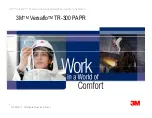
APOLLO 60 HP SUPPLIED-AIR RESPIRATOR
Page 8
5.1
Prior to operation, thoroughly inspect and clean
the helmet, breathing tube, respirator hose, air entry ports,
and fittings of all dust and debris. Inspect the helmet
suspension and adjust if necessary per Section 6.2.
5.2
Start the compressor and open the service valve
to pressurize the air supply line.
5.3
Check air pressure at the point of attachment. Set
the pressure between the minimum pressure assigned in
Section 4.2.4 and the maximum of 100 psi. Pressure must
be set with the respirator connected.
5.4
Check all safety, and breathing equipment used in
conjunction with the respirator as recommended by the
manufacturer.
5.5
Check respirator hoses and connections for tight-
ness and leaks.
5.6
Put the respirator on in a clean non-hazardous
environment, free of contaminants, where the air is safe to
breathe. When putting the respirator on or taking it off,
keep it upright to prevent dust and abrasive from falling
inside.
5.7
Position the chin strap so it fits comfortably under
the chin.
5.8
Position the knit cuff on the inner collar so that it fits
snugly around the neck in turtleneck fashion, without any
interference from clothing such as shirt collars. When
correctly positioned the smaller elastic end of the collar
must face up.
! WARNING
Correct placement of the inner collar is critical for
providing the protection for which the respirator
is designed. The collar must be positioned and
maintained without any interference from items
such as hair, facial hair, or shirt collars, between
the collar and user’s neck.
5.9
Pull the cape down to fully extend it and connect
the four elastic straps (two on each side) under the arms,
and tighten using the slides provided.
5.10
Put the belt and control valve on over the cape.
Buckle the belt around the waist, and tighten it by pulling
the belt end through the buckle insert.
5.11
When finished blasting and with cleanup, remove
the respirator in a clean, non-hazardous environment
where the air is safe to breathe.
! WARNING
Do not put the respirator on, or store it in a blast
contaminated environment. Do not remove the
respirator in a contaminated environment except
for emergency evacuation when the use of the
respirator hinders escape.
6.0
ADJUSTMENTS
6.1
Air Control Valve, alternate, Figure 2
6.1.1
Clemco’s Air Control Valve allows the user to
increase or decrease the volume of breathing-air while
wearing the supplied-air respirator. The valve provides a
range of 7 to 10 cfm of breathing-air when it is supplied with
respirable air as noted in Section 4.0. To regulate the air
supply, pull down and turn the large sleeve on the lower
end of the valve in the desired direction to increase or
decrease the air flow as needed. A soft hissing sound is
normal when the air control valve is in operation as some
air is allowed to escape underneath the sleeve to prevent
the entry of dust into the adjustment mechanism.
Figure 2.
Outlet End
(top of unit)
Pull sleeve down
and turn
to adjust air flow
Inlet End
(bottom of unit)
Higher
Lower
Adjustment
Sleeve
Belt Clip























